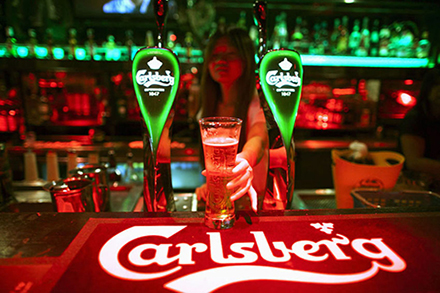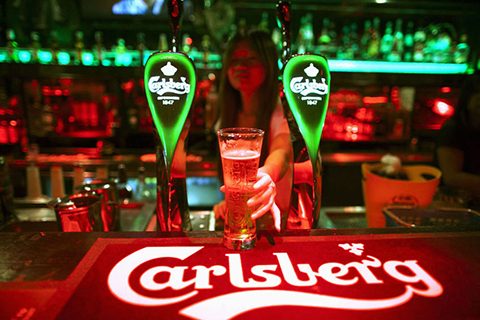
Luke Corbin looks at the spillover from fluid copyright laws and nationalism.
Brewing behemoth Carlsberg recently had a boil over in Myanmar.
The Danish company ceded to the wishes of a late songwriter’s family to change the name of one of their most renowned lager beers in order to avoid legal action and a potential public relations disaster.
Carlsberg emerged relatively unscathed from the near-scandal, though the “David vs Corporate Goliath” confrontation between private citizens and one of the world’s largest beverage corporations may yet set a precedent for other foreign investors navigating fluid copyright laws and nationalist sentiment in this emerging market.
The beer in question is Tuborg, a classic 19th century lager that started small and grew to become Denmark’s best-selling beer. The brand is a global phenomenon for Carlsberg, reaching from Iceland to India and a total of 70 countries worldwide. Carlsberg Asia Region senior vice president Roy Bagattini decided in January 2013 to bring Tuborg to Myanmar: “The timing is right for us to invest. The Myanmar beer market will grow strongly in coming years as the economy expands.” Backing up this evaluation was the fact that consumption of industrialised barley beer tripled in Myanmar for the years 2010-13.
Carlsberg initially operated in Myanmar from 1993-1996 but left citing political reasons. Under a 2013 agreement with partner Myanmar Golden Star, the brewing conglomerate purchased 51 per cent ownership of the joint venture Myanmar Carlsberg Co. The company’s first brewery was built in Bago for between US$50-75 million and began brewing in 2015; the site is capable of producing 600,000 hectolitres per year. In addition to Tuborg, the joint venture also started brewing the flagship Carlsberg and ရိုးမ (Yoma) brands for domestic consumption, using rice in addition to barley in the grist, the grain separated from the chaff of wheat — as is common to many US and Asian macro lagers.
Carlsberg’s re-entry into Myanmar should be seen in light of its failing Russian and Chinese operations and significant reported losses for 2015. The brewery is currently negotiating its “Funding the Journey” cost-rationalisation program, which saw the recent loss of 2,000 jobs (four per cent of the company’s global workforce) and the sale of “non-core asset” land at its Tuborg site north of Copenhagen for US$87.4 million. Last month the brewery also signed an agreement to sell one of its three malthouses to Viking Malt, a growing Finnish maltster itself recently making inroads into the Asia-Pacific, for an undisclosed sum.
The recent Tuborg controversy concerned transliteration into the Myanmar language. Carlsberg adopted the brand name “တူးပို့” for the beer, pronounced “Tu Po”, slightly different from the more literal transliteration “တူးဘို” or “Tu Bo”. Why did they do this?
Common wisdom says the brewery was trying to capitalise on the famous song Tu Po written by the late Myoma Nyein and strongly associated with Thingyan, the water festival celebrating the Burmese New Year each April.
Myoma Nyein was a well-known artist in colonial and independent Burma. He was born circa 1909, died in 1955 and wrote the song in question in 1940. It is claimed he composed over two hundred other songs, but none so fundamental to the Myanmar psyche as Tu Po — it can be confidently called the unofficial anthem of Thingyan. From the marketing desk of Carlsberg Asia, associating their famous beer brand with a well-known song and national holiday makes good business sense if done right.
The late Myoma Nyein’s descendants claimed they were approached by representatives of Carlsberg four times in 2014 with requests to use the song name — each time they refused permission. However, this still did not prevent the beer from entering production and hitting store shelves. The family threatened legal action, admitting the case would be unlikely to succeed. This brinksmanship strategy paid off, with Myoma Nyein’s grandson, Zaw Myo Oo, generating considerable support on social media by framing the dispute in populist terms, painting Myanmar as an unjust state with weak institutions:
Since we don’t have a proper copyright law, we know we’re going to lose the case, but we are doing this for every Burmese person losing their copyright due to a lack of rule of law.
The sentiment managed to galvanise not just Myoma Nyein’s fans but the general population in online outrage. Many netizens were particularly aggrieved at the association of the song with alcohol, feeling it conflated a Buddhist prohibition with the country’s national holiday.
A minority scoffed at the prospect of the legal case, decrying Myanmar’s musical scene as unoriginal, pointing to the many instances of copy thachin (the practice of Burmese artists using the melody of popular Western songs, but replacing the lyrics with the Burmese language) that Myoma Nyein and others have been accused of. Still others defended the songwriter, saying that while some of his songs may be inspired by Western songs, Tu Po is definitely an original piece.
When first contacted by The Irrawaddy in the wake of the family going public, Carlsberg Myanmar marketing director Birgette Weeke claimed that it was “(too) late to do the changes (to the beer’s name) as it has been on the market for a long time.”
However, following the social media firestorm and subsequent discussions with the family, Carlsberg resolved to change the beer’s name not from Tu Po to Tu Bo, but to the literal Danish name Tuborg, leaving Yoma as the only Myanmar language beer brand currently under the international Carlsberg banner. This repositions Tuborg in Myanmar as distinctly premium and international, rather than wedded to local customs and traditions.
Myoma Nein’s family accepted the decision and dropped their threats of legal action, but expressed disappointment that the company did not contact them directly.
Carlsberg’s “journey” to resurgent profits may not yet be complete, but its handling of the Tuborg case in Myanmar shows a semblance of sensitivity and commitment to the market there that should allow it to continue exploiting what they view as virgin territory. The “beer name” fiasco is another early chapter in Myanmar’s own international beer journey, which continues to gain momentum from Heineken’s recent joint venture with Alliance Brewing Company Ltd late last year.
It is also worth considering more generally just what is in a name, in a country whose very own name was until recently heavily contested – and many would argue, still is.
Luke Corbin is a PhD candidate in the School of Culture, History and Language at the Australian National University’s College of Asia and the Pacific.
 Facebook
Facebook  Twitter
Twitter  Soundcloud
Soundcloud  Youtube
Youtube  Rss
Rss 